Flights to Croatia: Volotea Regularly Connecting Mykonos to Croatia for First Time
November 25, 2019 - The latest news from around Croatia’s airports for new flights to Croatia with updates from Zagreb, Split, Dubrovnik, Pula, and Zadar.
Avio Radar reports that Spanish low-cost carrier Volotea has announced a new route in their 2020 flight schedule that will connect the Greek island of Mykonos to Dubrovnik. The new Mykonos-Dubrovnik route will run twice a week, on Wednesdays and Saturdays, from May 30, 2020. A Boeing 717-200 should service this line.
Thus, for the first time in history, Mykonos will be connected regularly to a Croatian destination. Mykonos is only the second destination in Greece to operate a regular line to Croatia.
Avio Radar also announced that LOT Polish Airlines, a member of the Star Alliance airline association, has begun selling tickets on the Warsaw-Rijeka route. Unlike prior announcements, the new Warsaw-Rijeka line will run for a shorter period of time, i.e., from June 7 to September 27, 2020. LOT will operate one flight per week, on Sundays. The Embraer ERJ-195 aircraft was announced for this route.
Other LOT Polish Airlines routes to Croatia (from Warsaw to Dubrovnik, Split, Zadar, and Zagreb) are on sale the same as this year. However, the Warsaw-Pula line is no longer on offer for next year. Additionally, this year’s new Krakow-Dubrovnik line has been canceled.
To wrap up this edition of flight news, HRTurizam writes that Croatian tourism workers will undoubtedly agree that the key even more success in Croatian tourism, whether we are talking about extending the season or increasing the average earnings from tourism, is an adequate investment in the development of tourism infrastructure, content and, offers, to optimize the "value for money" relationship, which, according to all research, is crucial when choosing a destination.
To this end, the Croatian National Tourist Board's Market Research and Strategic Planning Department has prepared an overview of direct flights and direct air connections of Croatian airports with 20 significant markets according to information obtained from Dubrovnik, Split, Zagreb, Zadar, Osijek, Pula, Mali Losinj, Brac and Rijeka.
You can see the document here.
To read more about travel in Croatia, follow TCN’s dedicated page.
Croatian Island Brač Building First Tunnel Near Ložišća
The Korito tunnel, the first tunnel on the Croatian island of Brač, is a critical portion of an important bypass, and everything could be finished by the beginning of the 2020 tourist season.
In April this year, a contract with the company Strabag d.o.o., worth HRK 32 million, was signed for the construction of a bypass around the town of Ložišća on the island of Brač. As JutarnjiList reports on November 24, 2019; the contractual deadline is 18 months, which means that construction of the tunnel is expected to be complete by late October 2020, Hrvatske ceste (Croatian Roads) reported.
The 1560-meter-long bypass of Ložišća, along with the Korito tunnel, is the most significant construction project ever undertaken on Brač. The tunnel is the first ever built on the island of Brač and the first tunnel being built on Croatian state roads in six years.
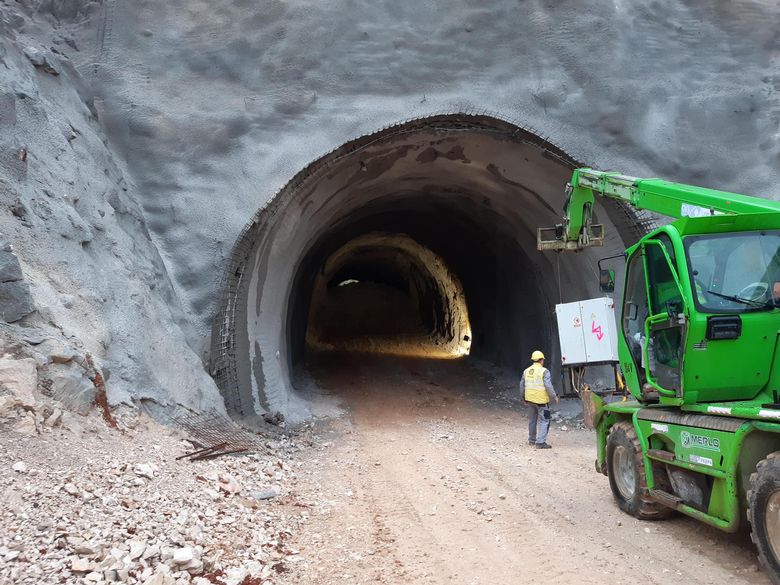
The Korito tunnel will be 190 meters long with portal structures and involve 160 meters of excavation. Excavation of the northern precinct of the Korito Tunnel began on August 1, 2019 and the tunnel excavation itself began on September 5.
At the beginning of October, at the end of tourist season, work began on the excavation of the southern portion of the tunnel, which temporarily closed the local road which connects the town of Bobovišća with the rest of the coastal road network. Traffic for this settlement has been diverted to a temporary road in partnership with the town of Milna and Mayor, Fran Lozić. Temporary communal, fire and other services have been set up to operate effectively on this modest-sized detour road. The excavation of the tunnel is being carried out according to conservation guidelines to preserve the church of Gospe od Korita (Our Lady of Korita), which is close-by.
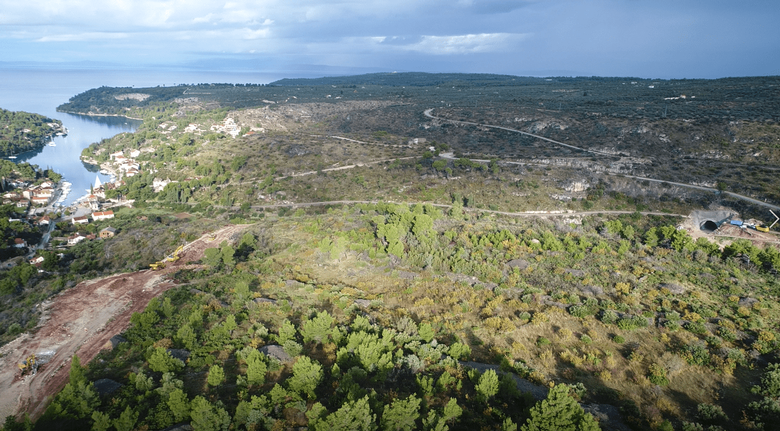
In order to re-open the seaside road to Bobovišća for traffic as soon as possible, completing construction on the southern concrete tunnel portal is the top priority and targeted for end of February 2020.
Work on the rest of the route is progressing well, and an early completion of the contractually agreed deadline is expected. In fact, it’s possible that the road will be in full use for the 2020 tourist season.
Hrvatske ceste, which operates a network of state roads with a total length of 7152 kilometers, is continually investing in the construction and upgrade of roads which connect the islands to the mainland. They are also improving the transport infrastructure of the islands, which is important for locals throughout the entire year and for tourists during the summer months.
Here is a video of the Korito tunnel project from Hrvatske Ceste:
And a recent aerial video of Ložišća on the island of Brač:
More information on Hrvatske Ceste (Croatian Roads) projects can be found on their excellent website here. For more information on infrastructure developments in Croatia, follow our lifestyle page.
Croatian Radio Television (HRT) Monthly Fee: Everything You Need to Know
According to the law, an 80 HRK monthly fee (or mjesečna pristojba), payable to HRT (Croatian Radio Television), is mandatory for anyone who lives in Croatia and owns a receiver which can accept transmissions of radio or audio-visual programs. Here is an explanation of where that money goes, your rights and how you can obtain an exemption.
You’ve just settled into a new address in Croatia and hear a knock on your door. But you don't answer, so they leave. Days later you receive your first monthly bill for 80 HRK (10,75 EUR) payable to HRT (Croatian Radio and Television)! Until recently, this questionable conduct was legal.
For a non-EU citizen, the controversial mandatory monthly HRT fee (or mjesečna pristojba) may come as an unwelcome surprise. HRT is considered “public television” in Croatia. Public television in the United States, for example, is mostly funded by donations from corporations, private benefactors and so-called “viewers like you”. So, by comparison, they depend mostly on revenue from voluntary, rather than mandatory sources. Only about 11% of US public television revenues come from federal sources, which are funded indirectly by taxpayer dollars.
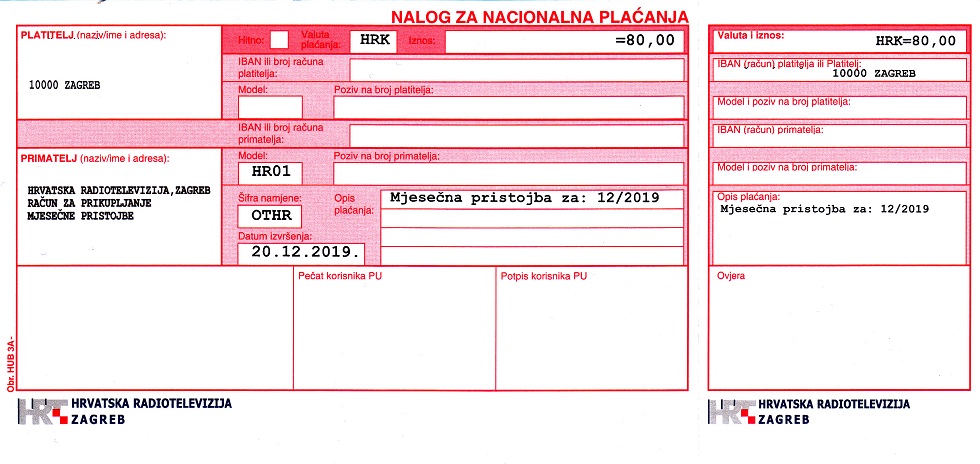
mjesečna pristojba
Who has to pay the Croatian Radio Television (HRT) monthly fee?
According to the Law on Croatian Radio and Television (Zakon o Hrvatskoj radioteleviziji), the monthly fee is mandatory for anyone who owns a receiver which can accept transmissions of radio or audio-visual programs. Radios, TVs, computers, laptops, car radios, smartphones and tablets are all considered receivers. If you or anyone in your household owns one or more of these receivers (one fee per household), you are required by law to pay the fee even if you're just a tenant.
Where does the HRT money go?
This monthly fee is not entirely allocated to HRT, rather a portion of it is earmarked for a special fund which finances other forms of electronic media.
HRT, as a public service broadcaster, and the beneficiary of a largest portion of the fee, must comply with a series of federal legal guidelines, and provide regular financial reports to the Croatian Parliament and public. The law stipulates that this type of public financing (along with the proceeds from advertising) ensures financial independence and therefore promotes high-quality independent media programming. You can read in more detail about these allocations here. A summary of how that money is allocated:
68.4% | 55 HRK - Program production costs.
11.7% | 9 HRK - Broadcasting, including appropriations for Transmitters and Communications (OiV), the Croatian Composers Society (HDS), the Croatian Performing Rights Protection Association (HUZIP) and the Association for the Protection, Collection and Distribution of Phonogram Rights (ZAPRAF).
4.5% | 3,5 HRK - Legal fees (the Fund for the Promotion of Pluralism and Media Diversity, the Electronic Media Council and the Croatian Audiovisual Center).
4.4% | 3,5 HRK - Expenses for the organizational units of the Croatian Broadcasting Company which are related to the performance of a public activity (Working Unit Fee of Croatian Radio-Television, Working Unit Archive of Croatian Radio-Television, Working Unit Internal Audit of Croatian Radio-Television).
11% | 9 HRK - Operating expenses (provisions, value adjustments and financial expenses).
Why wouldn’t people want to pay the HRT fee?
A monthly fee of 80 HRK may not seem like a lot of money. Nevertheless, that totals 960 HRK/130 EUR annually which is no small amount; especially for students and retirees. A supplemental health insurance policy or “dopunsko osiguranje” often costs less. And some people simply do not have, or don’t use, any of their receivers to watch or listen to HRT programming. So, why should they pay for a service they don’t use? A group called “ukinimo HRT pristojbu” (let’s abolish the HRT fee) has existed on Facebook since 2015 and has over 41,000 followers. Their website can be accessed here.
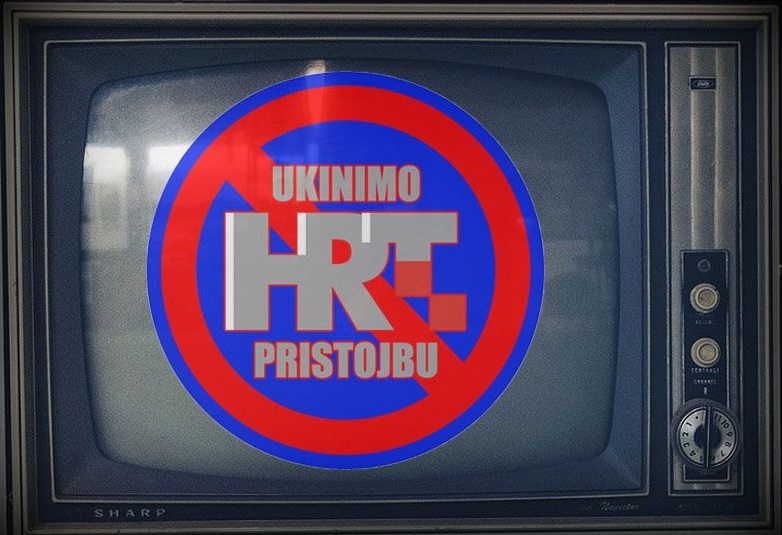
“ukinimo HRT pristojbu” (let’s abolish the HRT fee) | Facebook
How to obtain an exemption
It is possible to apply for an exemption. In order to unsubscribe from the mandatory fee, it is necessary to fill in the cancellation form titled “Zahtjev za odjavu obveze plaćanja mjesečne pristojbe”, which can be downloaded here. Just complete it, sign it and deliver it to the following address:
HRT
RJ PRISTOJBA
Prisavlje 3
10 000 Zagreb
This can be done in person, by mail or through an authorized individual. It is important to note that it is no longer necessary to authenticate (or notarize) the form. The cancellation takes effect from the first of the following month from the date of the signed received cancellation form.
The HRT cancellation form notes three acceptable reasons to “unsubscribe” from the fee:
- No receivers (for watching or listening to HRT programming). A separate written signed declaration must be included with the form.
- Moving to assisted living or a nursing home. Proof of the new address must be provided.
- Death of the “subscriber”. A death certificate is required.
Since most people have at least one receiver, choosing the first option seems infeasible. However, the burden of proof falls on HRT, and a recent court decision has made that burden even more difficult.
Is an HRT Inspector allowed to enter your home?
Due to a judgement from the High Administrative Court (Visoki upravni sud), enacted in August 2015, which bans unauthorized entry into private homes, no one is permitted to enter a private apartment or house without a court order and the presence of an authorized person (i.e. a police officer).
Therefore, no one is required to allow an HRT Inspector to enter their home to verify possession of any receivers. Recently, the Croatian Consumer Network (Mreža potrošača Hrvatske) went even further and claimed that HRT Inspectors were violating the law by conducting these payment checks for HRT. They urged citizens to resist "HRT arrogance" and call the police when they see HRT Inspectors in buildings or in front of their homes.
Nevertheless, there have been reports of recent incidents where people have allowed HRT Inspectors into their homes. Most of these cases involve tenants and students, who are unaware of the recent legislation.
A recent court decision also rejected the HRT practice of automatically subscribing anyone who doesn’t allow an HRT Inspector to enter their home, according to Narodni List. Before that court decision, that person would automatically begin to receive monthly bills for a subscription if they had refused entry to an HRT Inspector. That is no longer the case today. This also applies to ex-subscribers and HRT is not allowed to re-subscribe anyone by default.
How can HRT legally demand payment of the monthly fee?
The recent court ruling also explains that HRT may, however, file a misdemeanor charge (indictment) and initiate proceedings against anyone who is suspected of watching or listening to HRT programs on their receivers. Since a private household can legally refuse entry to an HRT Inspector, it will be difficult for HRT to prove that a household owns any receivers or uses them for HRT programming. However, streaming HRT content on a PC or the HRT smartphone app requires a user to register with an email address on the HRT website, which would allow their activity to be monitored.
For fans of HRT programming, the 80 HRK per month might be considered money well-spent. HRT continues to produce an array of fine programs, all of which can be streamed online, including the acclaimed Novine series, which was picked up by Netflix last year.
For more information on Croatian media and culture follow our Lifestyle page.
Croatia: Electric Companies Offer Solar Panels for Homes
Electricity from the sun: an initial investment of HRK 35,000 (4700 EUR) will pay for itself within six to eight years! The benefits of investing in a solar power plant on the roof of a single-family home in Croatia are up to 75 percent lowered electricity costs and will protect the buyer from rising market prices.
As Dubravko Grakalić/GlasIstre reports on November 19, 2019; alternative energy is becoming less and less of an alternative, and more commonplace for our households and small businesses. Croatia's two largest electricity companies, HEP and RWE, have begun offering to install solar power plants on rooftops of single-family homes or businesses so that Croatian citizens and residents can generate electricity for their own needs. Interested households can easily arrange with their respective electric providers to become energy self-sufficient.
Simplified Procedure in Croatia
Due its geographical location and number of hours of sunshine a year, Croatia offers considerable potential for harnessing solar energy, experts say, and emphasize that less than one percent of all electricity is currently produced from photovoltaic systems. In early 2019, with the adoption of the Renewable Energy and High-Efficiency Cogeneration Act; self-supply electricity is now regulated by legal norms and the process has been greatly simplified. This legislation has paved the way for Croatian households to make the most of the sun's energy for their own benefit and makes the use of solar power plants more accessible to everyone.
- The simplified procedure for issuing energy approvals enables citizens to become self-suppliers by having their own solar power plant installed, which will meet most of their electricity needs; even up to 75 percent. This offer applies primarily to households and small businesses within the tourism, hospitality and trade sectors, says Zoran Miliša, CEO of RWE Energija Croatia.
Setting up a solar power plant does not pollute the environment. And it produces electricity from sunlight, a renewable energy source, which is a safe and low-risk investment, according to the companies offering solar power plant installation to customers.
The benefit of investing in solar power plant on the roof of a single-family-home is up to 75 percent lower electricity costs and will protect the buyer from rising market prices. The repayment period is estimated at six to eight years. RWE Energija's solar power plant installation offer includes a 25-year warranty and 10 years of insurance. Customers can expect to have their power plants installed within 90 days and the installation itself takes up to two business days.
The solar consultants at RWE Energija handle the necessary documentation and provide advice on choosing an optimal solution for every roof. And clearly there is an increase in the value of rental space for tourists who prefer environmentally friendly accommodations and are willing to pay a higher price for them, they say at RWE. They also offer solar calculator on their website so that prospective customers can see for themselves how much they will save with a solar power plant.
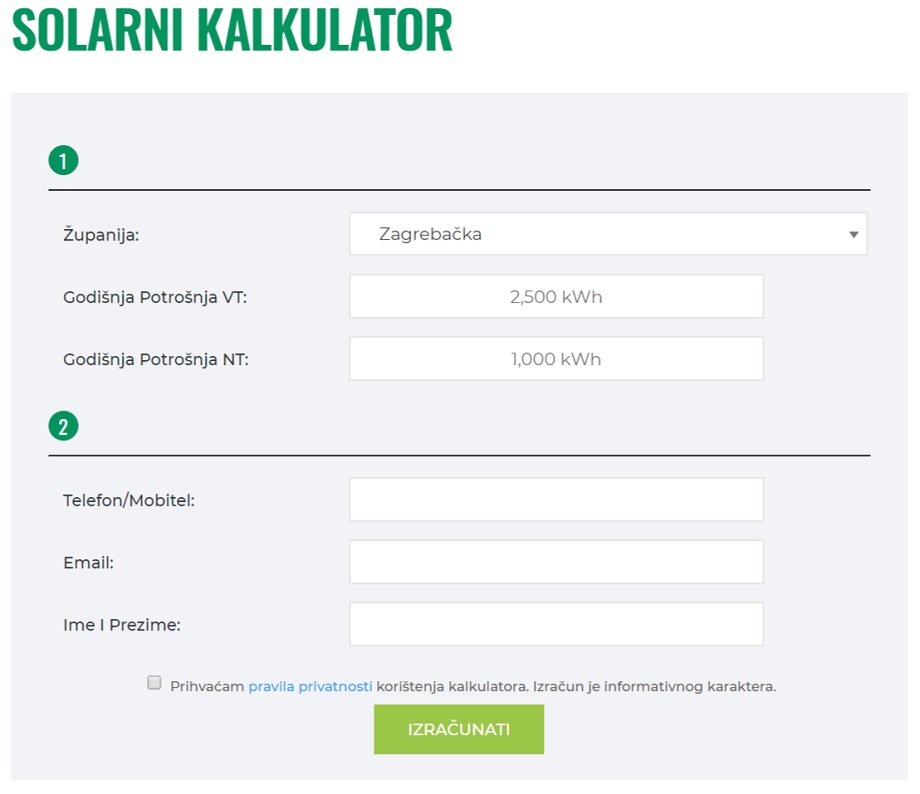
RWE Solar Calculator
After entering the real estate location and electricity consumption on an annual basis, the RWE solar calculator calculates the savings for every prospective customer. The calculator also accounts for the estimated power capacity of the power plant, the targeted amount of electricity, and the minimum roof area needed to install the solar panels. And it calculates the estimated repayment time. The minimum recommended annual consumption for the higher tariff is 2500 kWh. Then, the orientation of the roof, type of construction and the productivity of a solar power plant are assessed onsite. A perfect example is a family house on the coast with a north-south roof orientation. They calculate the available roof surface and consider that a power plant of 3 kWp requires about 18 square meters of roof. A 5 kWp power plant requires approximately 28 square meters of roof. The average power plant has a capacity of 3 kWp and is priced from HRK 35,000 (4700 EUR), which RWE Energija allows customers to repay over 36 installments.
Legalizing the power plant isn’t necessary since a mandatory part of the supporting documentation is proof that the building is legal (i.e. a building permit). As a solar power plant connects to a metered site, it is assumed that any building that has a meter is already legal, they explain at RWE energija. RWE will purchase any excess electricity produced by a solar power plant, but that is not currently a profitable venture for most home electricity producers.
HEP Upcoming Offer
HEP (Hrvatska elektroprivreda) will also offer two similar services to its customers very soon. HEP ESCO, a HEP company that offers various energy services, in collaboration with HEP Supply, will launch a HEPI Solar project designed for customers interested in erecting a solar power plant on their roof to cover their personal electricity consumption.
HEP will offer solar power plants from 4 to 10 kWp according to the ESCO model. This means that the company will independently finance the installation of such a power plant and maintain it for the ten years. The power plants will be paid for by the surplus electricity the plant produces, which will then be supplied to the grid. Signing three contracts is the only the legal prerequisite. The power plant will become the property of building owner after the contract period expires, HEP explained.
More information on the RWE solar plant offer and their solar calculator can be found here. Check out the HEP website regularly here for information on their upcoming solar plant offer.
For more information on clean energy in Croatia, follow our Lifestyle page.
Croatia Life Satisfaction: Second from Bottom of EU
“It’s a nice place to visit, but I wouldn’t want to live there,” so the saying goes, and that appears to apply to life for some in present-day Croatia. Recent research shows that Croats are extremely unhappy people.
As Gordan Duhaček/Index reveals on November 29, 2019; EUROSTAT has published data on life satisfaction in the European Union, and Croatia is again at the bottom of the chart. On the other hand, the citizens of Finland are most satisfied with their lives.
“Generally speaking; how satisfied are you with your life right now?" That is the question Eurostat asked thousands of Europeans in 2018, offering them the opportunity to answer on a scale from 0 ("not at all satisfied") to 10 ("completely satisfied"). The EU average in terms of satisfaction with one's life for 2018 is 7.3, which is a 0.3-point increase over 2013, when the survey began.
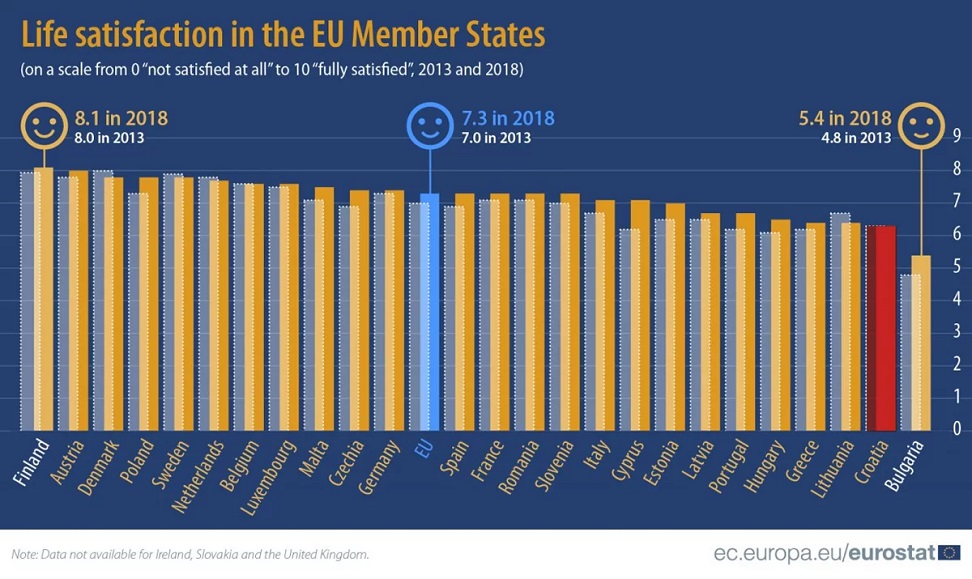
EU Life Satisfaction Increase
In five years, satisfaction with one's own financial situation has increased (in 2013 the average was 6, and in 2018 it was 6.5), as well as satisfaction with personal relationships (in 2013 the average was 7.8 and now 7.9).
But a more complex picture emerges by reviewing results across European Union countries. Finns rated their life satisfaction an impressive 8.1, while Bulgarians, who are least satisfied with their lives, gave their life satisfaction a 5.4 rating. Croats are second from the bottom of the rankings, with a reported life satisfaction rating of 6.3, which is below the EU average.
Lithuania, Greece, Hungary, Portugal, Latvia, Estonia, Cyprus, Italy, Slovenia, Romania, France and Spain all reported below-average ratings, while the Finns, Austrians, Danes, Poles, Swedes and Dutch are most satisfied with their lives.
From 2013 to 2018, life satisfaction increased among citizens of all 19 EU Member States, with Cyprus, Bulgaria and the Czech Republic enjoying the largest leap. And although Bulgarians are the least satisfied with their lives of all EU member states, they have grown more satisfied in the past five years. However, the same cannot be said for Croats.
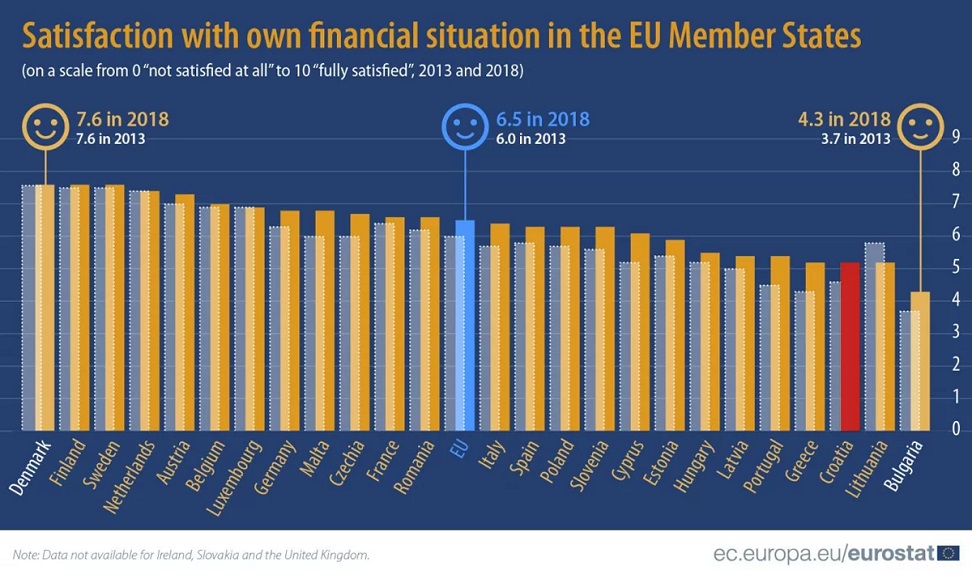
Croatia Not Satisfied
Specifically, Croats were equally (un) satisfied with their lives in 2013 and 2018, and only Belgians expressed the same level of satisfaction, but their satisfaction level is significantly above that of Croatia. Interestingly, in 2018, only four EU Member States performed worse, namely Lithuania (-0.3), Denmark (-0.2), the Netherlands (-0.1) and Sweden (-0.1). However, it shouldn’t be assumed that Lithuanians and the Dutch are equally dissatisfied, given that Lithuania is at the bottom of the ladder and the Netherlands is at the top. In other words, the decline in life satisfaction in the Netherlands by 0.2 percent is almost negligible, while the overall poor positioning of Lithuania is a much bigger challenge for its citizens.
Croats are also among the least satisfied with their financial situation (only Bulgarians and Lithuanians submitted worse ratings) and are well below the EU average, which garnered a 6.5 rating on a scale from 1 to 10 in 2018. Croats, however, rated their financial satisfaction at 5.1.
Citizens of Denmark, Finland and Sweden are most satisfied with their financial situation, with the largest increases in financial satisfaction from 2013 to 2018 were reported in Greece, Cyprus, Portugal, the Czech Republic, Italy and Slovenia.
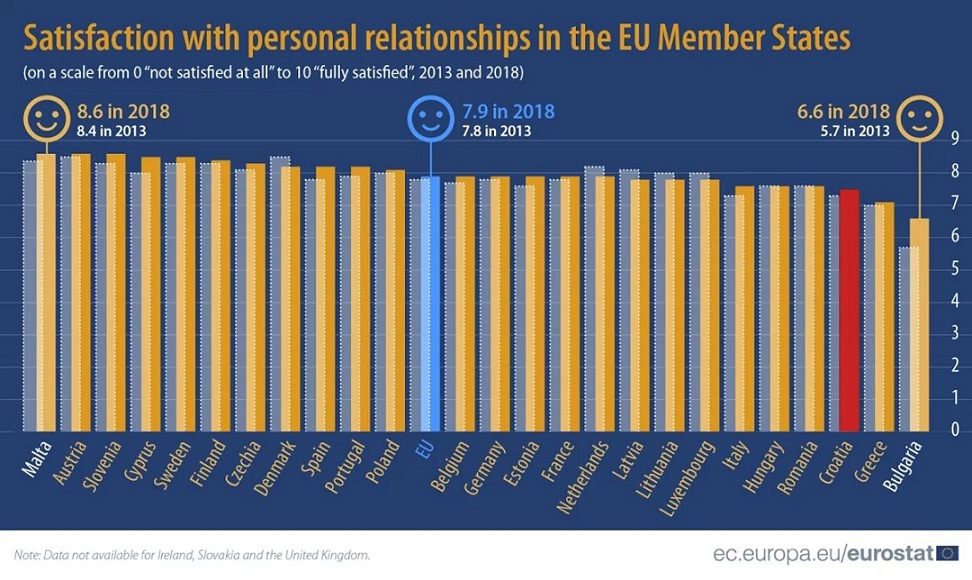
Croatian Relationships Lacking
The results in the category of personal relationships are particularly interesting. Malta is most satisfied (8.6 rating), followed by Austria, Slovenia, Cyprus and Sweden. This suggests that satisfaction with financial situation is not crucial to fostering good interpersonal relationships.
The Croats are at the bottom again, unfortunately. Only Bulgarians (6.6) and Greeks (7.1) are more dissatisfied with their personal relationships, while Croats with a score of 7.5, are now third in the EU. It is worth noting that this rating is only slightly higher than 2013, which suggests that Croats should be working on their interpersonal relationships.
In any case, Eurostat has demonstrated what some of us experience every day: Croats are a deeply dissatisfied nation, both in their lives and in their relationships with other people.
A detailed article is available on the Eurostat website here. For more information on life in Croatia, follow our Lifestyle page here.
Davis Cup Madrid: Croatia Knocked Out After Loss to Spain
November 20, 2019 - The Croatia tennis team will not defend their title at the Davis Cup this year.
Gol.hr reports that the Croatia tennis team registered their second defeat in the final tournament of the new Davis Cup format. After losing to Russia 0:3 on Monday, the title defenders lost to Spain with an unreachable result of 0:2.
Roberto Bautista Agut scored the first point for Spain, beating Nikola Mektic 6:1, 6:3 in just 57 minutes of play. In the second match, Rafael Nadal, the world’s best tennis player, defeated Borna Gojo 6:4, 6:3 in 30 minutes.
Croatia was left with no prospect of reaching the quarterfinals, and thus without a chance to defend the title of Davis Cup.
Croatia needed a 3:0 win against Spain to stay in the top eight. However, without Marin Cilic, who did not travel to Madrid, and without Borna Coric, who retired from the tournament today due to exhaustion, it was nearly impossible to expect a 3:0 victory over Spain, led by Rafael Nadal.
After Coric pulled out on Tuesday, Nikola Mektic, who made his last singles appearance over two and a half years ago in the Cincinnati qualifiers, was chosen to save the day.
Mektic and Bautista Agut, currently the ninth-best tennis player in the world, had never played one another before tonight.
The Croatian tennis player won the first game, but that was all he showed in the rest of the set. With three breaks in 26 minutes, the Spaniard won the set with a score of 6:1. Agut continued his great series in the second set, receiving three games in a row. Mektic reduced it to 1:3, breaking Agut's nine-game streak.
By the end of the set, the 30-year-old Zagreb native no longer lost his serve, but failed to make up for the break and ended the set with a score of 6:3 for the Spaniard.
In the second match, the 21-year-old debutant for Croatia solidly resisted Nadal, especially in the first set.
Gojo held on to 4:4 in the first set, saving four break points - three in the first game and one in the seventh game. Unfortunately, in the ninth game, Nadal took away Gojo’s serve and then safely served for 6:4 after 45 minutes of play. In the second set, he lost his serve in the first and ninth games for the final score of 6:3.
Recall, the young Croatian tennis player, who played for American Wake Forest University, joined the Croatia team after Marin Cilic’s injury.
Croatia will try to win a consolation point when Ivan Dodig and Ante Pavic face Marcel Granollers and Rafael Nadal in the final doubles match.
To read more about sport in Croatia, follow TCN’s dedicated page.
Croatia Gas App: Student Launches Gas Station Locator
Gas Station Locator: A student from Osijek just launched an app which shows where to find the cheapest nearby fuel in Croatia! The application, which is available in English, German and Croatian, currently tracks prices at gas stations from the five major oil companies in Croatia. There are also plans to expand the service to the rest of Southeast Europe.
As reported by Mladen Smrekar/tportal on November 20, 2019; the new application was created by Matej Arlović, a 23-year-old student of Software Engineering at the Faculty of Electrical Engineering, Computing and Information Technology in Osijek.
Gas Station Locator
"After almost four months of development and administrative tasks, I’ve reached the moment where the Gas Station Locator application is ready for public release," said Matej Arlović, a 23-year-old student of Software Engineering at the Faculty of Electrical Engineering, Computer and Information Technology in Osijek, on Facebook. “A big thank you to everyone who helped me with this project: from developing and testing concepts, to writing articles and translations. This is my first experience with Android apps, so if you find any bugs let me know and I will fix them.”
The application monitors the prices at gas stations from five major oil companies in Croatia: INA, Petrol, Tifon, AdriaOil and APIOS. Information on the companies, gas stations and the prices of petroleum products are checked and updated regularly.
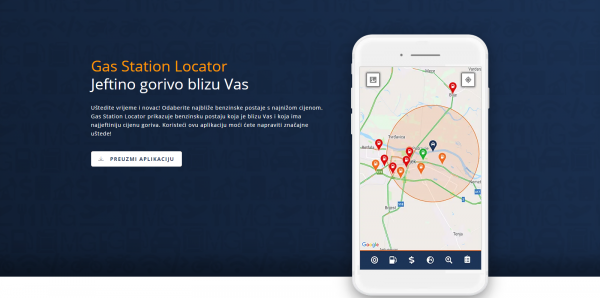
Cheapest Fuel in Croatia
"The goal is for the user to come up with the cheapest nearby fuel options, which result in significant savings," Arlović says. “Our algorithm does not predict fuel prices but uses current prices at gas stations. Fuel prices are updated on a weekly basis.”
The Gas Station Locator uses the user’s location to find the nearest gas station with cheapest fuel. Your location is detected when you enter the application, and if you are on the move you can refresh your location by clicking the button. Refreshing the location also moves the marker showing the user’s location, and the algorithm automatically searches for gas stations in the new location. If the new location is more than 100 kilometers away, the data will reload.
The user’s location is not saved, however, and the application will delete it after shutdown. As the team at Gas Station Locator points out: their goal is to preserve users' privacy.
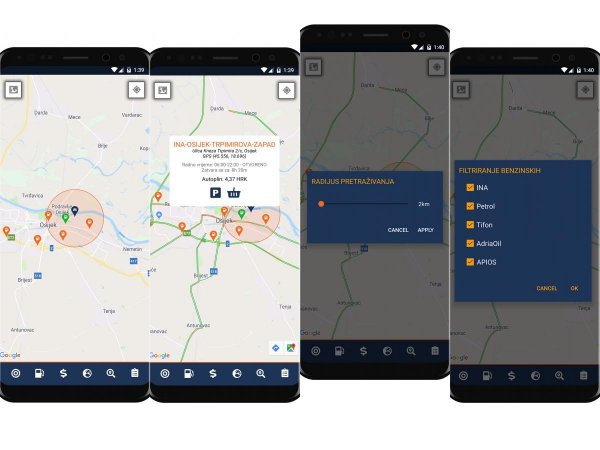
Additional Services
In addition to fuel prices, the app shows additional services offered by gas stations: from restaurants and cafés to car washes. You can also find the gas station’s business hours and opening/closing times. Holidays and seasonal hours are also calculated within the algorithm.
You can download the app from the Google Play Store here and on the Gas Station Locator website, where you can find additional information about the service.
Follow our Made in Croatia page to keep up with new apps and products from Croatia.
Euro Under-21 Qualifiers: Croatia Loses to Czech Republic, Records Second Defeat in Group
November 18, 2019 - The Croatia Under-21 national team hurt their chances of qualifying for the 2021 European Championships after losing to the Czech Republic 1:2 in Velika Gorica on Monday.
It was the second defeat of the young national team in four games played thus far, and the second loss at home, reports Gol.hr.
Croatia opened the qualifiers with a defeat at home to Scotland (1:2), after which Nenad Gracan was fired and the team was taken over by Igor Biscan. In his debut on the bench, Croatia celebrated in San Marino 0:7 and then against Lithuania away 1:3. However, they suffered an unpleasant defeat against the Czech Republic at home on Monday.
Croatia led in the game thanks to Luka Ivanusec who scored in the 31st minute, but the Czechs turned the result with goals from Ladislav Krejci (39) and Pavel Bucha (72).
The young Croatia team entered the game forcefully and had a great chance already in the second minute by Petar Musa, but Martin Jedlička defended his shot. In the 19th minute, Josip Brekalo had an even better chance against the Czech keeper, but Jedlička responded once more. Croatia, however, finally took the lead in the 31st minute thanks to Luka Ivanusec.
Unfortunately, only eight minutes later, the Czech Republic equalized from a corner when Krejci scored. In the second half, the Czech Republic turned the score completely thanks to Pavel Bucha in the 72nd minute, who used the confusion of defenders Branimir Kalaica and Josko Gvardiol.
Domagoj Bradaric was booked for a red card in the last minute of the game.
The Czech Republic now leads the group with 11 points, Greece follows in second with 10 points, Scotland is in third with eight points and Croatia is in fourth with six points. Lithuania (4) and San Marino (0) make up the last two spots in the group.
The next U-21 national team game is against Scotland on March 27.
To read more about sport in Croatia, follow TCN’s dedicated page.
Croatia is Going to Euro 2020: What's Next?
November 17, 2019 - The Croatia national team secured their spot at the European Championships next summer after defeating Slovakia 3:1 in Rijeka on Saturday night. Here’s what they can expect next.
The first part of the qualifications for the 2020 European Championships will end on Tuesday when the final group games are scheduled. After Tuesday, we will know twenty national teams that have qualified, who will compete in the tournament from June 12 to July 12 in twelve host cities in twelve different countries.
The national teams confirmed for the Euros so far include Austria, Belgium, Croatia, Czech Republic, England, Finland, France, Germany, Italy, Netherlands, Poland, Russia, Spain, Sweden, Turkey, and Ukraine.
The first game will be played in Group A, in Rome, Italy starting at 9 pm.
You can see a breakdown of the cities and stadiums hosting the competition below:
GROUP A
Rome (Italy) - Olimpico (72.698)
Baku (Azerbaijan) - Baku Olympic Stadium (68.700)
GROUP B
Saint Peterburg (Russia) - Gazprom Arena (68.134)
Copenhagen (Denmark) - Parken (38.065)
GROUP C
Amsterdam (Netherlands) - Johan Cruyff Arena (54.990)
Bucharest (Romania) - Arena National (55.600)
GROUP D
London (England) - Wembley (90.000)
Glasgow (Sweden) - Hampden Park (52.063)
GROUP E
Bilbao (Spain) - San Mames (53.332)
Dublin (Republic of Ireland) - Aviva (51.700)
GROUP F
Munich (Germany) - Allianz Arena (75.000)
Budapest (Hungary) - Puskas Arena (67.889)
ROUND OF 16
Bucharest, Copenhagen, Bilbao, London, Glasgow, Dublin, Budapest, Amsterdam
QUARTERFINAL
Saint Petersburg, Munich, Rome, Baku
SEMIFINAL
London
FINAL
London
The draw for the final tournament takes place at ROMEXPO in Bucharest on Saturday, November 30 at 6 pm.
The draw will involve the two top teams in the ten qualifying groups and the eventual four play-off winners (decided in March 2020, and identified as play-off winners. Recall, the final four places at the Euros are determined by the Nations League playoffs, which you can read more about here.
UEFA writes that the seedings are based on overall European Qualifiers rankings, including:
a) final position in group
b) points
c) goal difference
d) goals scored
e) away goals scored
f) number of wins
g) number of away wins
h) lower disciplinary points total (3 points for red card including for second booking, 1 point for single yellow card for a player in a match)
i) position in overall UEFA Nations League rankings
Croatia has a virtually confirmed among the top seeds, with Belgium and Italy being the only safe thus far. But there are also complications with these seeds. Some national teams may have to be transferred to a higher or lower qualitative group in order for the draw to be concluded normally. In addition, for political reasons, neither Russia, which has qualified, nor Kosovo, which can still qualify, can go to Group B.
All will be made more apparent after Tuesday, when the group qualifications are over and when we find out who qualified directly and must still qualify via the Nations League play-offs.
For now, we can be thankful that Croatia didn’t complicate their route to the tournament next summer.
To read more about sport in Croatia, follow TCN's dedicated page.
Croatia Basketball to Host Olympic Qualifying Tournament in Split
November 15, 2019 - Croatia Basketball will host one of the Olympic qualifying tournaments in Split from June 23 to 28, 2020. They will return to the Dalmatian capital for the first time in 21 years.
The FIBA Executive Board decided on Friday at a meeting in Geneva that Croatia, or Split, will host one of the four qualifying tournaments for the Tokyo Olympics next summer, reports the Croatian Basketball Federation.
The Olympic qualifying tournaments are one of the most important and prestigious FIBA competitions, and the winner of each of the four tournaments will secure a place at the Tokyo Olympics. As each of the 24 national teams that have qualified for the tournaments has already proven to be high quality, the tournaments will certainly be very attractive for spectators.
The Olympic qualifying tournament in Split will be held from June 23 to 28, 2020.
"This is a big deal for Croatian basketball, after Eurobasket 1989, it is the strongest and most important competition on Croatian territory and should be used to promote basketball in that region and throughout the country, and we will do our best to get our best result,” said coach Veljko Mrsic after learning the good news.
"In order to talk about the odds, however, we have to wait for the draw and see who will come and with what kind of squad. It will depend on the NBA as well, because the finalists will not be able to perform," said Mrsic. For Croatia, Mrsic would have to worry most about Ivica Zubac and the LA Clippers, as well as Croatia captain and current Utah Jazz Bojan Bogdanovic.
In addition to Croatia, the tournament organizers will be Canada (Victoria), Lithuania (Kaunas) and Serbia (Belgrade). Six teams will compete in each of the four qualifying tournaments, with only the top-ranked going to Tokyo.
The draw for qualifying Olympic tournaments will take place on November 27 in Geneva.
The following nations will play in the qualifying tournaments: Angola, Brazil, Czech Republic, Dominican Republic, Greece, Croatia, Italy, Canada, China, Korea, Lithuania, Mexico, New Zealand, Germany, Poland, Puerto Rico, Russia, Senegal, Slovenia, Serbia, Tunisia, Turkey, Uruguay and Venezuela.
In the men's competition, the Olympic Games have already been secured by Japan as the host and seven teams from the World Cup, including two from Europe (Spain, France), two from the Americas (USA, Argentina) and one each from Oceania (Australia), Africa (Nigeria) and Asia (Iran).
To read more about sport in Croatia, follow TCN’s dedicated page.


